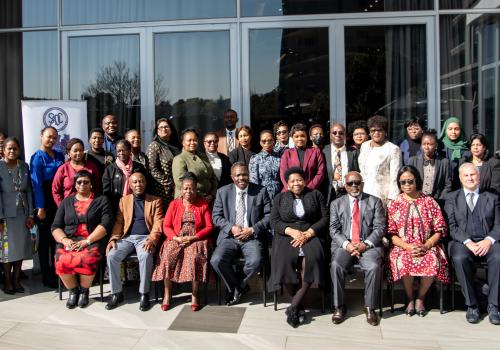The Southern African Development Community (SADC) Secretariat, in collaboration with the United Nations Development Programme Regional Service Centre for Africa (UNDP-RSCA), hosted a Regional Consultation workshop on the Implementation of the Women, Peace and Security Agenda in Johannesburg, South Africa, from 25th to 28th July 2022.
The meeting served to engage Member States on the implementation of the Women Peace and Security Agenda (WPS) in the SADC Region and was supported by the Government of Canada and the European Union (EU). Key speakers and discussants included representatives of the African Union Commission (AUC), UN Women, ACCORD, ECOWAS, ICGLR and the SADC Mediation Reference Group.
The WPS Agenda, which is informed by United Nations Security Council Resolution (UNSCR) 1325, promotes a gendered perspective and women's equal and meaningful participation in peace processes, peacebuilding, and security processes. The UNSCR 1325 acknowledges that conflict and post-conflict situations render women and girls more susceptible to sexual exploitation, displacement, kidnapping and changing power relations within households and accentuates poverty. In 2018, the SADC Regional Strategy on Women, Peace and Security (2018-2030) was developed as a means to fulfilling the Women’s Peace and Security Agenda in the Region, and continues to serve as the basis upon which National Action Plans (NAPs) on WPS are being fashioned.
The objective of this regional consultation was to provide a platform for SADC Member States to share their experiences, best practices, challenges and recommendations in the implementation of the WPS Agenda and development of NAPs. The meeting also served to review and validate the SADC Assessment Report on the Progress and Challenges in Implementing the WPS Agenda at Regional and National Levels, a study commissioned under the Support to Peace and Security (SPSS) Programme in the SADC Region, implemented by the SADC Secretariat and supported by the EU. This assessment noted that six SADC Member States (Angola, Democratic Republic of Congo, Malawi, Mozambique, Namibia and South Africa) have adopted NAPs on UNSCR 1325. Although six out of 16 SADC Member States have adopted NAPs, many SADC countries without the NAPs continue to implement different components of the WPS Agenda.
In addition, this regional meeting also raised awareness of SADC Member States on the importance of utilising the African Union Continental Results Framework on WPS (AU-CRF) in tracking and monitoring progress on the WPS agenda. The AUC adopted the CRF to institutionalise regular and systematic monitoring and reporting on the progress made in the implementation of the WPS Agenda, generate data and enhance transparency and accountability on commitments made.
During the opening session, Her Excellency Mme Bineta Diop, Special Envoy of the Chairperson of the AUC on WPS, urged SADC Member States to see the CRF and a call to report as their commitment and contribution to the advancement of the rights of women to peace as enshrined in Article 10 of the Maputo Protocol. In addition, Ms Diop encouraged Member States without NAPs to also adopt a NAP as the WPS Agenda is relevant to all countries, especially as nations are facing multiple crisis of climate change, conflicts, and pandemics which continue to negatively impact the human security of citizens, particularly women and girls in Africa.
The discussions during the SADC WPS Regional Consultations took into consideration the different types and nature of conflicts in the SADC Region, the development and implementation of the NAPs by Member States, monitoring, evaluation and reporting concerns, barriers to women’s participation in peace and security processes and the reflections from good practices, opportunities and challenges in localising the WPS Agenda.
One of the key messages from the meeting is that the WPS Agenda is crucial in realising the goals and aspirations set in the SADC Regional Indicative Strategic Development Plan (RISDP) 2020-2030; the AU’s Agenda 2063 and the UN Agenda 2030, including countries in conflict, post-conflict contexts and those in peace-time. This agenda is about recognising women's key roles in building peace and security, while also promoting the rights of women and girls, and protecting them from violence in conflict and non-conflict situations, including protection from sexual and gender-based violence.
Officially opening the meeting, the Deputy Minister of International Relations and Cooperation of the Republic of South Africa, Honourable Candith Mashego-Dlamini, indicated that despite the Region’s commitment to mainstreaming gender into SADC’s peace and security mechanisms and processes, women remain largely excluded from official peace negotiations and are often marginalised during the implementation of peace accords.
The regional meeting concluded by identifying key actions and recommendations to facilitate accelerated implementation of the WPS Agenda in the SADC Region. The need for SADC Member States to engage in sensitisation and awareness-raising processes was identified. SADC Member States were also encouraged to institutionalise reporting and monitoring of progress on the WPS Agenda and to strengthen their early warning systems in support of conflict prevention capacities. Member States also noted that inclusive and broad-based consultations at national level and establishment of multi-sectoral coordination mechanisms to operationalise the Agenda are critical steps.
The meeting also noted that technical support should be provided to Member States on the development and implementation of NAPs and the use of the AU CRF to facilitate reporting on progress. The meeting recommended strengthened efforts in promoting gender-parity in Peace Deployment Missions and in integrating gender considerations and perspectives into the mediation processes.

